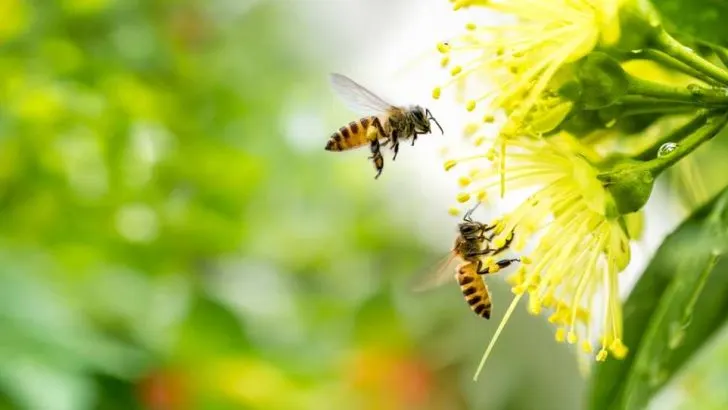Bearded dragons are specific pets with specific diets, so you must have thought to yourself “Can bearded dragons eat bees?”. Believe me, you are not the only one that has asked themselves this very question.
The answer to the question is not that easy! Sure, bearded dragons eat a lot of insects and bugs, but bees aren’t necessarily safe for your beardie. Eating one bee is usually safe!
However, there are some specifics when it comes to bearded dragons eating bees. To understand beardies’ diet better and to see what happens if your bearded dragon eats a bee, I suggest you keep scrolling!
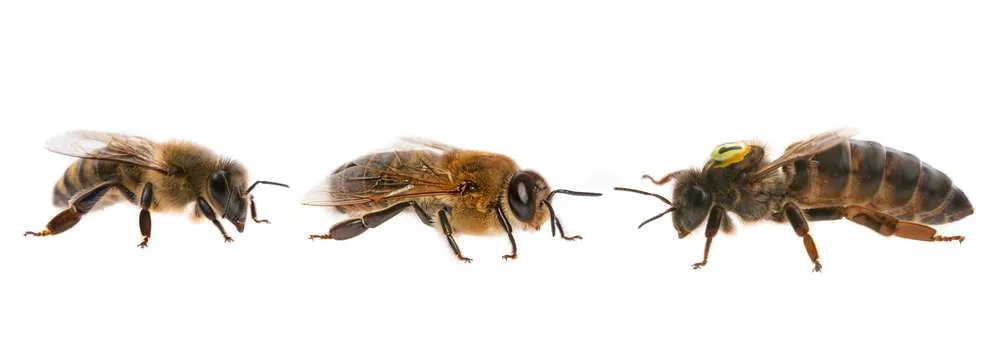
Bees – A Potential Danger Or A Crunchy Snack?
Every bearded dragon parent knows that this pet can have a rather…unusual diet, so to say. Because bearded dragons can eat various bugs, it’s only natural to wonder whether your pet can eat bees.
The truth is – bees should not be a regular part of your pet’s diet, even if your bearded dragon likes to eat them. You should do your best to keep your beardie away from bees.
Of course, that is easier said than done! Beardies love their time out in the sun, and since sunbathing is something they need and enjoy, it can be difficult to keep an eye on them at all times.
So, if your beardie does eat a bee – don’t panic just yet. The only thing that you should do is be on the lookout for any swelling. If you notice that there is swelling around the head or neck, visit the vet as soon as you can.
Generally, the swelling is immediate or should appear in the first few hours after the beardie ate a bee or two. If your beardie seems fine, trust me, he’s fine.
However, if your bearded dragon is still a baby, I highly recommend taking him to the vet anyway. Adults bearded dragons can eat lots of pretty unusual things, but when they are babies, they can have stronger reactions to the foods they will easily digest when they get older.
So, we can say that the bees aren’t a crunchy snack, but they sure are a potential danger. Do your best to keep your bearded dragon away from bees.
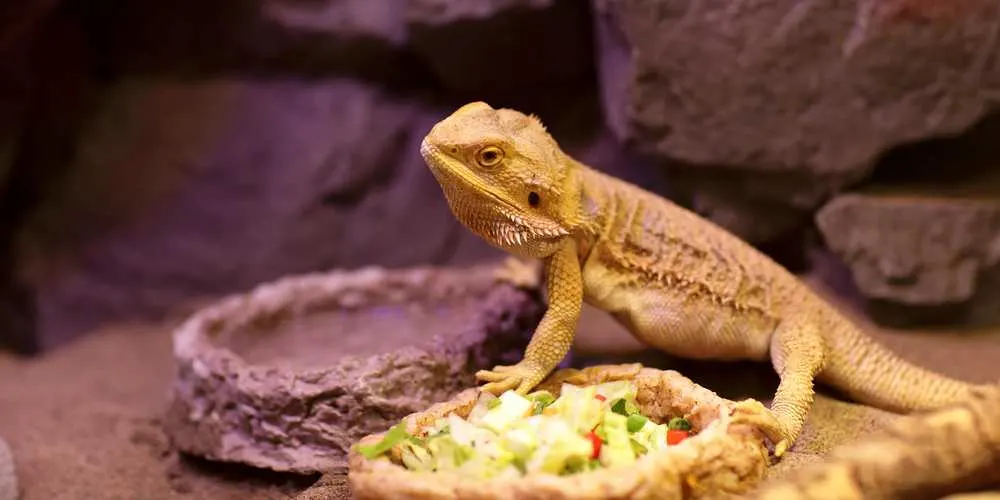
What If My Bearded Dragon Ate A Lot Of Bees?
Reptiles like bearded dragons are becoming more and more popular as pets. So many people have them and love to spend time with them.
Moreover, going out for a day in nature seems even better if you take your pet with you, right? Going out into the woods with your beardie can be so fun, but it puts the beardie close to loads of bees. Beardies being beardies, they will try – and probably succeed at eating a whole bunch of them.
Now, what can you do? Is it time to panic or are you worrying about nothing?
First of all, eating one bee can cause a reaction in your beardie, let alone a bunch. Check for swelling inside the mouth to see whether a bee has stung your poor pet or not.
Next, be on the lookout for any unusual behavior after your beardie has eaten lots of bees. If you see that he is acting weird or lethargic afterward, it could be a cause for concern.
The exoskeletons of bees can be difficult for your beardie to digest, especially if there is quite a bit of them. Be on the lookout for the symptoms below to see if your beardie is experiencing indigestion.
How Can You Tell If Your Bearded Dragon Is Having Issues Digesting?
Bearded dragons are generally strong and robust beings – but they can have health issues nonetheless. Indigestion is just one of them!
When a bearded dragon does eat quite a few bees, he or she can have digestive issues passing the exoskeletons of bees. So, look out for symptoms like:
- Acid reflux
- Vomiting
- Puffing his beard
- Lethargy
- Refusing to eat.
Do keep in mind that all bearded dragons are different and therefore, indigestion can have various other tell-tale signs. Simply, look for unusual behavior.
The worst symptom of all is refusing to eat because it can result in your breaded dragon becoming seriously ill. If your beardie doesn’t eat for a day or two at all, go to a vet that specializes in reptile health.
The vet will likely opt for an ultrasound to see if your poor baby has some food clogged somewhere along their digestive tract. The vet will prescribe some meds or some treatment that will help your beardie pass the food.
What Can I Give My Bearded Dragon To Soothe Indigestion?
Mild to medium serious cases of indigestion can be easily treated at home. The key is to feed your beardie foods that won’t add up to indigestion but help pass all the food.
So, keep away from foods rich in protein, because protein is not easy to digest. In reality, eating lots of protein on top of digestive issues can make the symptoms of indigestion even worse.
The best food for a beardie with indigestion is wax worms. Wax worms are super easy to digest and they can help your beardie pass all the food from their belly.
Stick to soft, easily digestible foods. You can prepare some warm baby foods like pureed pumpkin, prune, or apple. Also, you can give your beardie some canned pumpkin – but provided you rinse and dilute it with water first.
Also, if your bearded dragon isn’t so interested in eating, you can give them 100% fruit juices. Just make sure that the juices are sugar-free!
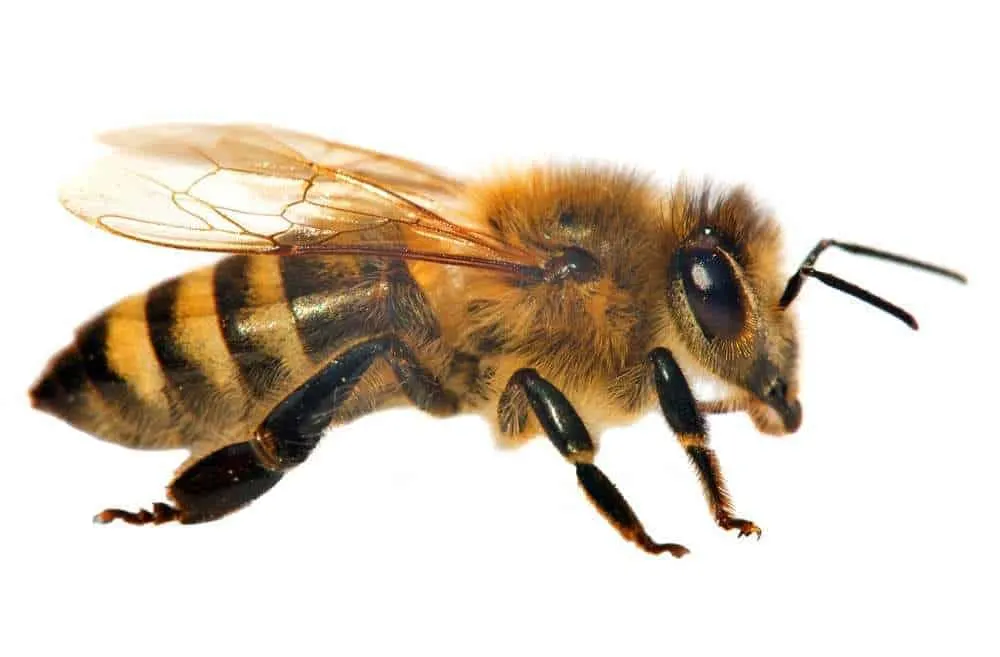
Are Bees In Any Way Safe Or Nutritious?
The bees are, as we already concluded, potentially dangerous for bearded dragons. How so?
Well, as your bearded dragon puts the bee in his mouth, the bee is still very much alive. As the bee is on the beardie’s tongue, it can sting his tongue and cause a reaction.
It may seem unlikely, but it can happen – and the sting will cause tongue swelling, and the whole head of your beardie can swell, too. If the bearded dragon is still young, you should keep him away from bees.
On the other hand, bees are an excellent source of protein and other nutrients. Beardies, like all living things, need a balanced diet, and that includes a good amount of protein.
So, should you give your bearded dragon bees? Absolutely not!
In this case, the cons outweigh the pros because of all the complications the bees can bring to the table. The bees being a good source of protein is undeniable, but considering this protein-rich meal can result in an expensive trip to the vet makes them a bad idea every time.
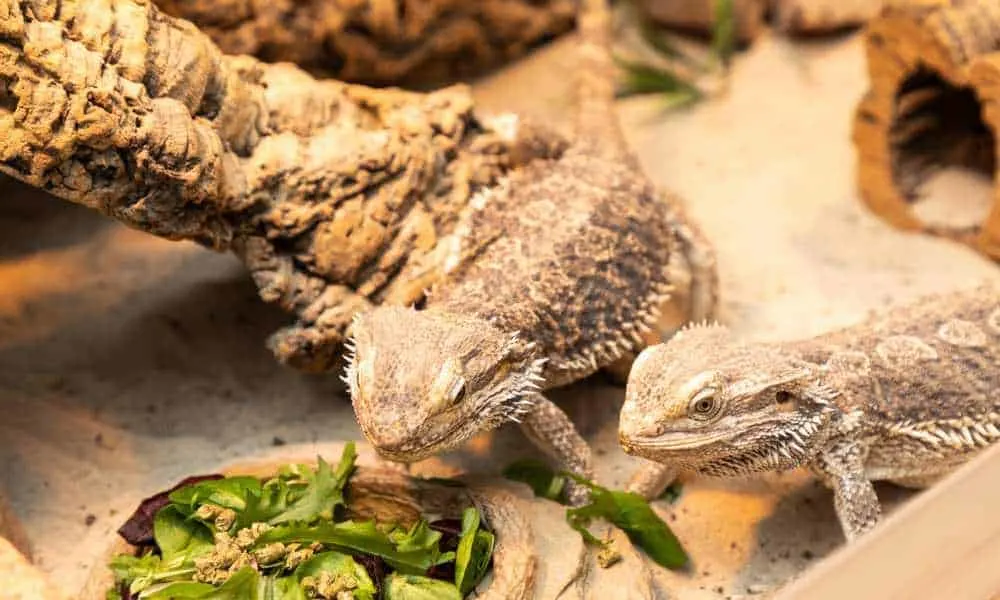
What Is The Best Diet For Bearded Dragons?
Bearded dragons are wild animals of sorts, and they have a specific diet that works for them. Even in captivity, they need to eat a balanced diet to thrive.
The perfect diet for bearded dragons consists of plenty of protein, leafy green veggies, and fruit. The beardies’ diet should consist of 75% leafy greens and fruits, and 25% vertebrates and insects.
The best leafy greens for your bearded dragons are collard greens, dandelion greens, as well as kale. These veggies are very nutritious and will provide your beardie with the calcium they need.
Moreover, other veggies your bearded dragon is bound to love are carrots, pumpkin, sweet potato, and cabbage. As for the fruits, stick to feeding your beardie strawberries, blueberries, peaches, apples, and watermelon!
The bees may not be the best bug for your bearded pet, but your beardie still needs insects and vertebrates in their diet. The dubia roaches and earthworms are the best bugs for your bearded dragon.
Beardies can also eat crickets and super worms – and they can be included in their daily diet. However, you should feed your beardie crickets and super worms for variety only. These bugs are not easily digestible, so you should stick to roaches and earthworms as a staple in their diet.
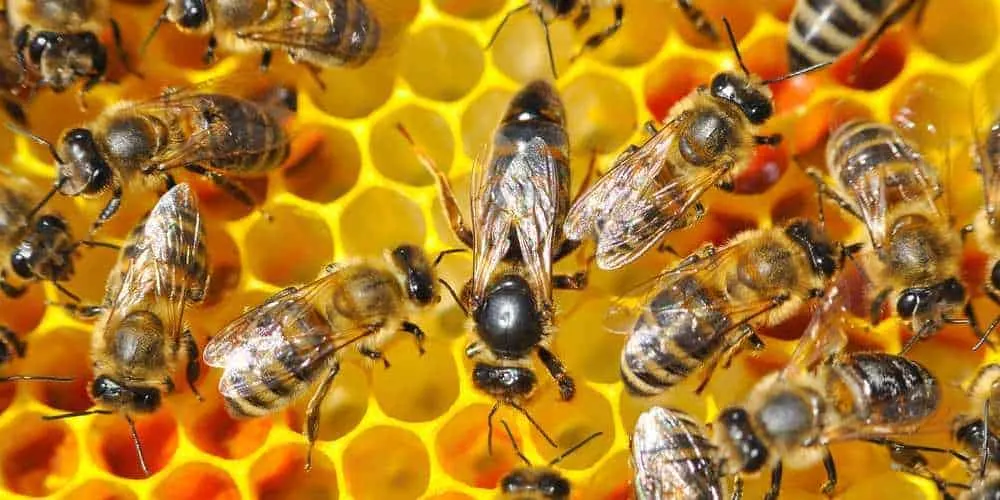
Can Bearded Dragons Eat Bees? – Bottom Line
To conclude, bearded dragons can and probably will, no matter what you do, eat bees. Chances are, your beardie will eat a couple of bees when sunbathing outside, whether you like it or not.
The key is to keep an eye on your beardie if you do see him eating a bee. If you notice any swelling around the head, you should take him to the vet immediately.
Bees may seem like a protein-rich food, but they could be so dangerous for beardies, especially young ones. In my opinion, not worth the hassle, especially for young bearded dragons. There are so many other nutritious options for your pet, why would you potentially put him in danger if you don’t have to?
Related Read: Can Bearded Dragons Eat Wasps?

